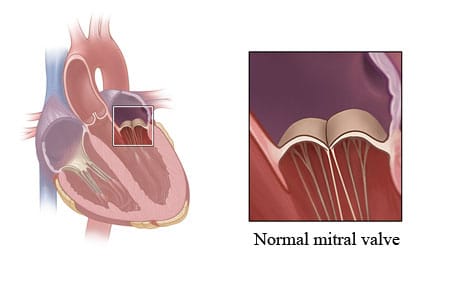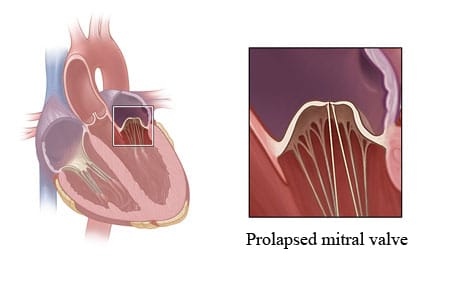Mitral Valve Prolapse
What is mitral valve prolapse?
Your mitral valve controls blood flow on the left side of your heart. The valve opens and closes with each heartbeat. It works like a one-way gate, letting blood flow from your upper heart chamber to your lower chamber.
When you have mitral valve prolapse (MVP), the valve closes after blood flows through. Blood flows normally through the valve. But the valve bulges backward a little. It looks like a tiny parachute or balloon as it bulges.
Most people with mitral valve prolapse don't have complications, don't need treatment, and can live a normal, healthy life.
Mitral valve prolapse raises your risk of having a problem called mitral valve regurgitation. This problem happens if the valve does not close tightly enough and blood leaks back (regurgitates) into the upper chamber of the heart. The heart then has to work harder to pump this extra blood.


Mitral valve prolapse is a condition that affects the mitral valve of the heart.
The mitral valve is between the left upper chamber (left atrium) and left lower chamber (left ventricle) of the heart. This valve has two leaflets, or flaps, that open when the heart relaxes and close when it contracts. The base of each leaflet is attached to the heart muscle by strong, flexible cords called the chordae tendineae, which control the opening and closing of the mitral valve. These cords are thin and white. They look like the strings of a parachute.
In a normal heart, the two mitral valve flaps close completely, and stay closed, when blood is pumped out of the heart to the body.
When you have mitral valve prolapse, the valve closes after blood flows through. But the valve flaps bulge backward a little when blood is pumped out of the heart. When the valve bulges, it looks like a tiny parachute or balloon.
What causes it?
Mitral valve prolapse may be caused by certain health problems such as connective tissue diseases or endocarditis. Mitral valve prolapse can also be passed down through family members. With mitral valve prolapse, there are physical changes with the valve.
What are the symptoms?
Most people do not have any symptoms. You may not even know you have MVP until a doctor hears a "clicking" sound or a murmur when listening to your heart. Your doctor may want you to have a test called an echocardiogram to check for mitral valve prolapse.
How is mitral valve prolapse treated?
Most people who have mitral valve prolapse do not need treatment for it. You will likely get regular tests that check how well the mitral valve is working. A heart-healthy lifestyle and regular exercise are recommended for most people.
How can you care for yourself?
Heart-healthy lifestyle
- Do not smoke. If you need help quitting, talk to your doctor about stop-smoking programs and medicines. These can increase your chances of quitting for good.
- Eat heart-healthy foods. These foods include vegetables, fruits, nuts, beans, lean meat, fish, and whole grains. Limit sodium, alcohol, and sugar.
- Stay at a weight that's healthy for you. Lose weight if you need to.
- Get healthy sleep. Most adults need 7 to 9 hours of sleep each night.
- Manage other health problems, such as diabetes, high blood pressure, and high cholesterol. If you think you may have a problem with alcohol or drug use, talk to your doctor.
- Get recommended vaccines, such as COVID-19, flu, and pneumonia.
Activity
- Be active. If you have not been active before, talk with your doctor before starting an exercise program. Get at least 30 minutes of exercise on most days of the week. For many people. walking is a good choice. You also may want to do other activities, such as running, swimming, cycling, or playing tennis or team sports.
Related Information
Credits
Current as of: October 2, 2025
Author: Ignite Healthwise, LLC Staff
Clinical Review Board
All Ignite Healthwise, LLC education is reviewed by a team that includes physicians, nurses, advanced practitioners, registered dieticians, and other healthcare professionals.
Current as of: October 2, 2025
Author: Ignite Healthwise, LLC Staff
Clinical Review Board
All Ignite Healthwise, LLC education is reviewed by a team that includes physicians, nurses, advanced practitioners, registered dieticians, and other healthcare professionals.



